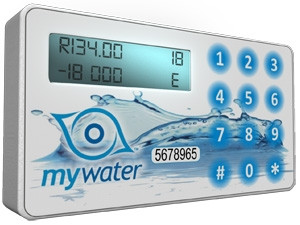
In high-income areas, households commonly spend 1% of their monthly income on water. This increases to anywhere from 5% to 15% for middle-class households, and the poor spend between 20% and 400% of their income on water.
For Larry Symington, CEO of specialist manufacturer and ICT company, MyWater, no one should be spending this much on water. He suggests the best way to reduce this spend is through communication.
When fitted into a household, the MyWater meter system details how much homeowners owe the municipality and how much water they have used. "If you have a bath, it will tell you how much that bath cost rand for rand."
According to Symington, the communication aspect of the system is a key differentiator. If the water meter runs for more than 15 minutes without stopping, a buzzer will alert the homeowner. If the water continues to run, the system will send an SMS, alerting owners that they may have forgotten to switch something off or perhaps indicating that they could have a water leak.
In addition, the MyWater system has a feature that allows users to alert the municipality in the event of a leak, he says.
The meter's data is accessible in the cloud, making reading automatic, says Symington. While automatic meter reading is nothing new, he notes that this system delivers account information to the consumer first, even before the municipality.
An additional security feature on the device offers users a "panic button" of sorts, says Symington. The button on the MyWater interface will alert five people immediately in the event of an emergency, which he describes as a totally unique feature on this type of technology.
The team from MyWater have also developed a water consumption calculator app, which calculates how much an average household should be spending on water each month.
According to Symington, his work in rural areas, where government allocates a certain amount of free water to community members, has shown that people often use water without thinking and he has seen people amass four- and even five-figure water bills.
This system will alert people when they have used up that free water, he says, with the hope that it will make them a little more conscious about their water use. "If the free water is finished, we will send them an SMS alerting them that they are going into debt."
At present, the first time people find out how much water they have used is when they receive their monthly account, which means they often get quite a shock, says Symington. "We are giving them access to information in real time. Now they can take responsibility for their water use. The key here is communication," he stresses.
"Through communication, we are looking to turn the boring water meter into something more exciting. To measure is to know, and to know is to take responsibility."
The MyWater system is set to launch in 2014.
Share